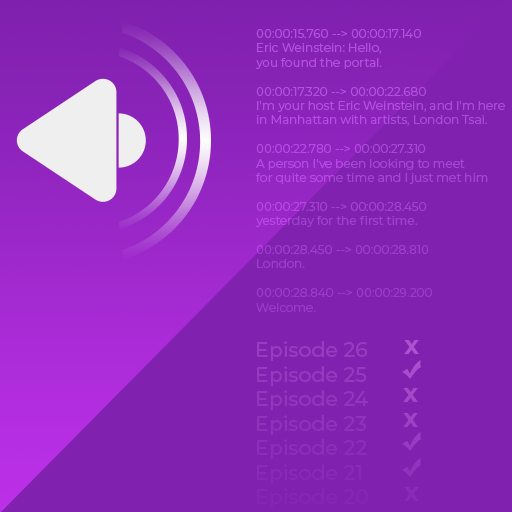Transcript Style Guide
| The Portal Transcripts (Transcript Completion Project) | |

| |
| Information | |
|---|---|
| Topic | The Portal Podcast |
| Leader | pyrope#5830 BeefSandwich27#0143 Aardvark#5610 |
| Start Date | 31 January 2020 |
| Methodology | Transcript Workflow |
| Style Guide | Wiki Page |
| Portal Media Spreadsheet | Sheet |
| Google Drive | Drive |
| Links | |
| Website | The Portal Blog |
| Discord | Link |
| The Portal Group Discord | Link |
| All Projects | |
Style guide for The Portal Transcripts. Link.
Word Processor Configuration
- Disable smart quotes
- Disable Substitutions
Spelling Help
Search for unknown terms or names, or search for some of the words in their context to find their proper spelling.
Headings
Generally, our transcripts will be posted on pages under a level 2 heading, so any subheadings in the transcript should begin at a level 3 heading.
Paragraphs
Paragraphs should contain a whole idea.
Paragraph Breaks
Paragraph breaks don't always have to be for total change of topic. The next subtopic in a line of thought can be broken into its own paragraph to help readability. Also keep in mind that an increase of paragraphs will cause an increase of timestamps, which may be useful for more technical subjects.
Timestamp
The timestamp is italicized, always of the form 00:00:00 (hours:minutes:seconds). It marks the beginning of a paragraph. It is separated by a line break (Shift + Enter) instead of a paragraph break. This can be checked by triple-clicking a paragraph to select it, and seeing whether the timestamp is also highlighted as part of the selection.
Speaker Tag
The speaker tag is bold, punctuated by a colon, and in-line with the paragraph.
Punctuation
Our punctuation rules.
Commas
Use the Oxford comma.
Comma before single and double quotes that begin a new clause.
Hyphenation
Hyphenate certain words.
Dashes
Em-dash or long dash (—) for interruptions (mid-word or mid-sentence) or abrupt change in a sentence's topic. No space after the dash.
En-dash (–) multiple names used as an adjective, such as in Teller–Ulam design or Yang–Mills theory.
Ellipses
Ellipses can be used in some places instead of dashes, if a speaker is trailing off for instance. Put a space after ellipses. They can be treated as periods or commas for the capitalization of the next word.
Quotations
Comma before single and double quotes that begin a new clause.
Double quotes for dialogue or speech, terms or phrases, and scare quotes. For dialogue and speech, end-punctuation is inside the quote. Otherwise it is outside, or there is no punctuation.
Single quotes for thoughts. If it the sentence ends inside a single quote, end punctuation is placed inside the quote.
Indirect Quotations
Indirect quotes (no quote marks) when it's hypothetical speech or . Use your own judgment. No comma before indirect quotes. Don't capitalize first word of indirect quotes.
Capitalization
Capitalize essay titles.
Capitalize book titles.
Acronyms
Acronyms are capitalized and unpunctuated: PhD, UK, USA, DISC, etc.
Slogans that reduce to acronyms are capitalized, i.e. "Make America Think Harder (MATH)".
Name acronyms are capitalized and punctuated: M.C. Escher.
Portal Terms
Portal terms aren't capitalized: embedded growth obligation, gated institutional narrative, etc.
However, Portal terms that are explicitly proper nouns are capitalized: The Portal, Wokistan, Magastan
Italicization
Italicize book titles.
Italicize foreign language phrases/terms i.e. sine qua non, unless they're in non-dialogue quotes.
Numbers
Numbers greater than ten should be written out as numerals. Numbers less than ten can also be written as numerals so long as it's internally consistent within a transcript.
Year references such as "seventies" and "eighties" should be rendered as '70s, '80s.
Mathematics
Math grammar rules here.
Typesetting
LaTeX compatible with MathJax.
Diagrams
Screenshots or recreations in LaTeX or Draw.io
Editor's Notes
When necessary, add a missing, unspoken word to clarify the meaning of a sentence, i.e. [if], [the], etc. "... I have seen no printed discussion of where the supposed trading records of this person [are], who seemed to amass a fortune."
If there is an obvious flaw in grammar of something spoken, add [sic] after the mistake, i.e. "I didn’t felt <nowiki>[sic<nowiki> ..."]
If something is inaudible or unintelligible, write [Inaudible] or [Unintelligible] where it occurs.
Miscellaneous
For words that end in "m" extended with -my, add the ending to the existing word, don't conjugate it. "Spectrum" + "-my" = "Spectrummy"
